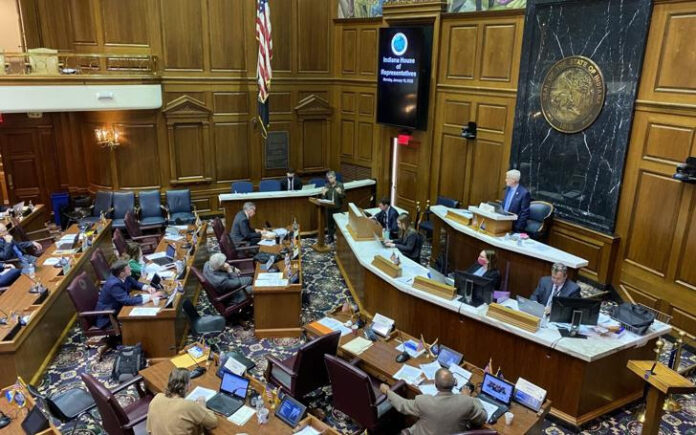INDIANAPOLIS — School board members from across Indiana voiced opposition Tuesday to a Republican-backed proposal that would add political party identifications to what are now nonpartisan school board elections throughout the state.
The bill’s author, Rep. J.D. Prescott, R-Union City, said the impetus of the bill stemmed from voter demands for more transparency from school board members.
He contended during a bill hearing at the Indiana Statehouse on Tuesday that knowing a candidate’s party affiliation will help voters know where a school board candidate stands “on the political spectrum” and how they view national issues. Political party chairs will also help recruit more candidates and lead to more engagement in the election process, Prescott said.
“School boards handle one of the largest budgets with our local elected office,” Prescott said. “When I look at Republicans or Democrats, I think you can tell a difference between financial responsibility and moral character in some cases.”
Candidates running for school boards would be required to identify as a Republican, Democrat or Independent, according to the legislation.
Currently, Indiana is among 42 states where local school board elections are held without any party identification on the ballot for candidates.
More than a dozen school board members from districts across Indiana pushed back on the plan, however, arguing that such steps would needlessly further insert politics into local school decisions.
Terry Spradlin, executive director of the Indiana School Boards Association, said politics may compromise the ability of school boards “to put kids first” and make school board members “feel conflicted about where their allegiances lie.”
Spradlin said the school board association instead recommends moving to a hybrid system, where local voters would decide whether to create a partisan school board for their school district.
“We believe candidates for school board should be elected on their qualifications, merits, experience and platform, no matter their political party affiliation. School boards are not immune from political conflict … but inviting politics into the boardroom … could have the unintended consequence of further fueling such conflict,” Spradlin said. “There is no Democrat or Republican way to transport and feed children, pay bills, plan facility improvements, or approve school calendars.”
Adam Burtner, director of government affairs for the Indy Chamber, testified that partisan school board elections would shift electoral accountability from “engaged voters and parents” to “political parties and apparatuses.” That change could jeopardize nonpartisan interests of the business community and overall innovation in Indianapolis, he added.
“It’s our view, and frankly our fear, that this disincentives thoughtful, qualified candidates to run, and leads our school districts down a path of more partisan division and toxicity, and less successful outcomes for Hoosier students,” Burtner said.
John O’Neill with the Indiana State Teachers Association, the state’s largest teachers union, further testified that the House bill would cause school board elections to become “beholden” to party leaders’ influence. They system in place is working, he said, with “open dialogue, debate and problem solving” already taking place in open forums at board meetings.
“It’s reckless to assume that every local education issue can be captured by dividing boards into dichotomous, ideological or party sides,” O’Neill said. “We believe this bill will only bring more polarization into schools at a time when communities, schools and families have been torn apart by the pandemic battles over masking and vaccines, curricula issues and other political divisions.”
The bill did not leave the House elections committee Tuesday. The committee chairman, Rep. Tim Wesco, said the proposal would be held, and no date has been set for a vote that could move the bill to the full House.
Six others bills seeking to alter school board elections have been filed in the House and Senate, although no hearings have been scheduled for those proposals so far.
The bills come amid complaints among conservatives across the country about public schools, and commotion in some school districts in Indiana over topics ranging from COVID-19 mask mandates to teaching about racial injustice.
Indiana Republican lawmakers are now looking at steps they argue will give parents more sway over what happens in classrooms.
State legislative leaders are additionally touting bills that would increase transparency with parental access to classroom materials, prohibit “discriminatory concepts” from being taught in classrooms and allow parents to opt their students out of face mask or vaccine requirements.





